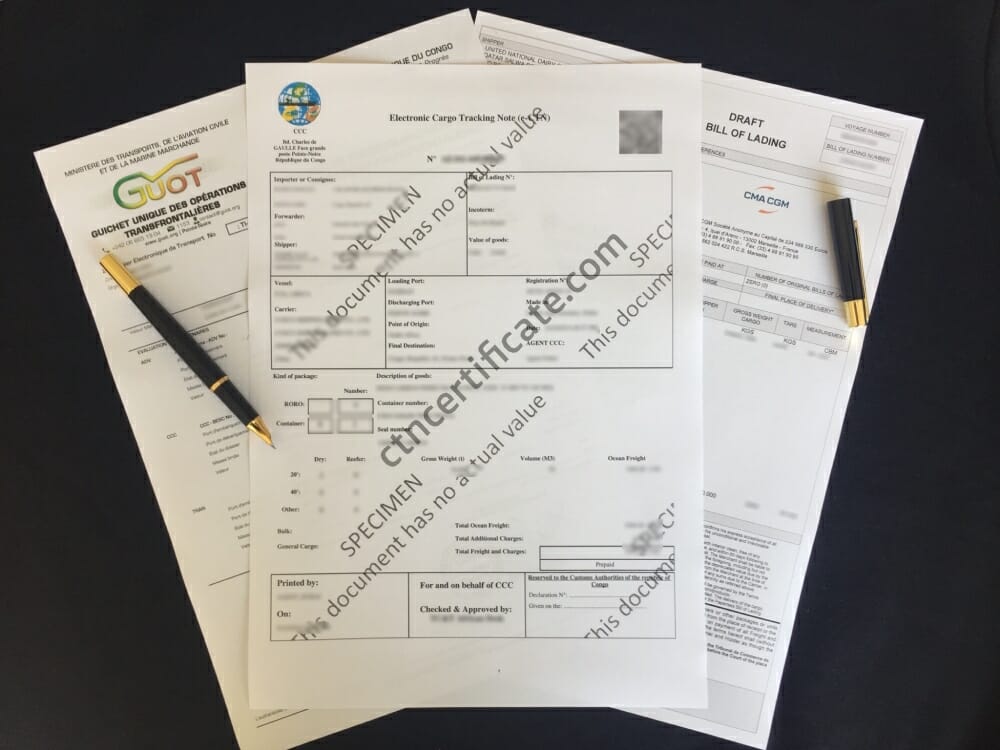ECTN stands for Electronic Cargo Tracking Note. This digital verification document is required for approving, tracking, and monitoring cargo shipments in various countries, especially in Africa.
ECTN is known by different names in each country, such as CTN, BESC, FERI, CNCA, BIETC, and ENS. However, they all refer to the same concept – a cargo tracking note.
It is a mandatory certificate.
Now that you know the meaning and full form of ECTN, let’s explore other aspects.
Before you continue reading, feel free to contact us to obtain your own ECTN Number.
How does ECTN document look like?
Given below is an ECTN certificate for Republic of The Congo.

Which countries require ECTN?
Countries that require ECTN are
- 🇦🇴 Angola CNCA: Conselho Nacional de Carregadores de Angola
- 🇧🇯 Benin BESC: Bordereau Électronique de Suivi des Cargaisons
- 🇧🇫 Burkina Faso ECTN: Electronic Cargo Tracking Note
- 🇧🇮 Burundi ECTN: Electronic Cargo Tracking Note
- 🇨🇲 Cameroon BESC: Bordereau Électronique de Suivi des Cargaisons
- 🇨🇫 The Central African Republic: Electronic Cargo Tracking Note
- 🇹🇩 Chad BESC: Bordereau Électronique de Suivi des Cargaisons
- 🇨🇩 The Democratic Republic of Congo FERI: Fiche Electronique Renseignement a L’Importation
- 🇩🇯Djibouti ECTN: Electronic Cargo Tracking Note
- 🇬🇶 Equatorial Guinea ECTN: Electronic Cargo Tracking Note
- 🇬🇦 Gabon BIETC: Bordereau d’Identification Électronique de Traçabilité des Cargaisons
- 🇬🇲 The Gambia: Cargo Tracking Note
- 🇬🇭 Ghana CTN: Cargo Tracking Note
- 🇬🇼 Guinea Bissau CEE: Certificado Eletronico De Embarque
- 🇬🇳 Guinea Conakry ECTN: Electronic Cargo Tracking Note
- 🇨🇮 Ivory Coast BSC: Bordereau de Suivi des Cargaisons
- 🇱🇷 Liberia CTN: Cargo Tracking Note
- 🇱🇾 Libya ECTN: Electronic Cargo Tracking Note
- 🇲🇬 Madagascar BSC: Bordereau de Suivi des Cargaisons
- 🇲🇱 Mali BSC: Bordereau de Suivi des Cargaisons
- 🇳🇪 Niger BSC: Bordereau de Suivi des Cargaisons
- 🇳🇬 Nigeria ICTN: International Cargo Tracking Note
- 🇨🇬 The Republic of Congo ECTN: Electronic Cargo Tracking Note
- 🇸🇳 Senegal BSC: Bordereau de Suivi des Cargaisons
- 🇸🇱 Sierra Leone ENS / BSC: Entry/Exit Summary Number
- 🇸🇴 Somalia CTN: Cargo Tracking Note
- 🇸🇸 South Sudan ECTN: Electronic Cargo Tracking Note
- 🇹🇬 Togo CTN: Cargo Tracking Note
Why is ECTN required?
There are multiple reasons why ECTN is required.
ECTN is required to enhance security, facilitate customs clearance, and ensure proper documentation of cargo shipments entering or leaving the countries.
Security: ECTN enhances security by providing detailed information about the cargo being transported. It enables authorities to monitor and track shipments. It helps to reduce the risk of illegal or unauthorized activities.
Customs Clearance: It allows customs officials to verify the accuracy of cargo information and ensures compliance with import/export regulations.
Trade Monitoring: It helps in calculating how much trade is happening in terms of volume, weight and monetary value. This information is valuable for the government to conduct statistical analysis, economic formulate policies, maintain trade balance and govern the issues.
Risk Assessment: ECTN enables authorities to assess potential risks associated with specific shipments. By having comprehensive information about the cargo, they can identify and mitigate potential threats such as prohibited items or hazardous materials.
Revenue Collection: ECTN facilitates the collection of customs duties, taxes, and fees related to international trade. By having a clear record of the cargo details, authorities can accurately assess and collect the appropriate charges.
Compliance with International Standards: ECTN requirements are often aligned with international standards and conventions, ensuring harmonization and consistency in trade practices across different countries.
Who is responsible for obtaining ECTN?
Obtaining an ECTN is the responsibility of the shipper or their authorized representative, such as a freight forwarder or shipping agent. It is the party responsible for ensuring compliance with the ECTN regulations of the destination country. Contact us to find how we can help you throughout the process.
As the shipper, you or your authorized representative, such as our company, will need to initiate the ECTN process. This involves providing necessary information about the cargo and submitting the required documentation to the designated ECTN issuing authority or agency. The process may include completing application forms, detailing the cargo specifics, and paying any applicable fees, which vary by country.
How long does it take to obtain an ECTN?
We provide a draft ECTN within 24 hours. Contact us for an accurate estimate of the delivery time.
In general, the processing time for an ECTN varies depending on the country and its specific requirements. The process can be completed in as little as a day or up to a week, depending on your readiness.
What happens if I don’t have ECTN?
Failure to obtain an ECTN can result in:
- Penalties and fines
- Delays in custom clearance
- Legal repercussions
- Shipment refusal risk
- Hampering relationships
Can an ECTN be modified or canceled?
In some cases, modifications or cancellations of an ECTN can be made before the shipment departs. However, this is subject to the regulations and policies of the respective country.
Are there any alternatives to ECTN?
Some countries may accept alternative cargo tracking systems or documents. However, it is crucial to consult with our experts or the authorities to understand the specific requirements of the destination country.
Am I exempted from getting ECTN?
Some rare scenarios allow you to be exempted from getting ECTN. Contact us to confirm.
Following scenarios might apply for exemption:
- Humanitarian aid
- Government shipment
- Diplomatic shipment
- In-Transit Cargo



